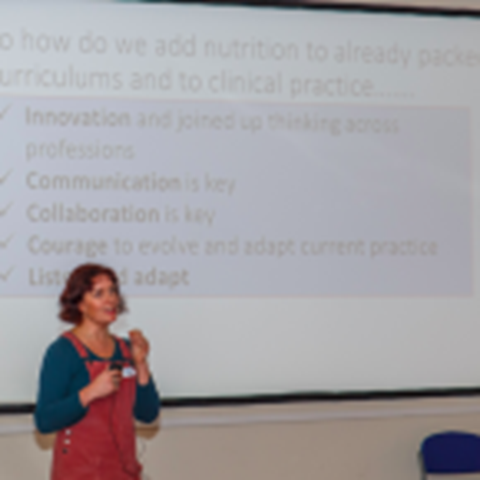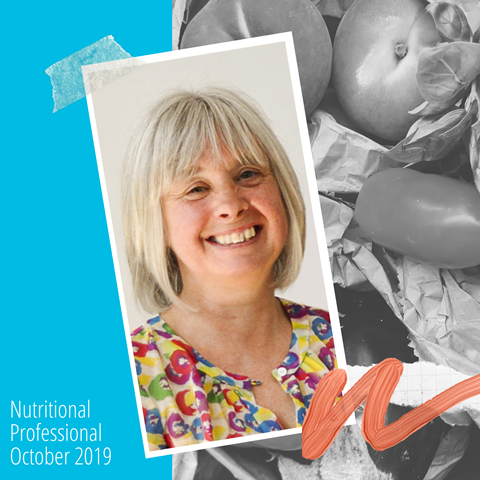Lucy Upton is a Specialist Paediatric Dietitian with 10 years’ experience. She currently works full time for the NHS at a busy children’s hospital, alongside keeping herself busy with various freelance ventures alongside including running her own private clinic. She works with an MDT team at a specialist feeding clinic, consulting for the Infant & Toddler forum and more recently delving into PR work and social media. When she’s not working, she loves baking, keeping active, travelling and reading.
Hi Lucy, thanks for joining us! What led to your interest in nutrition and dietetics?
I always knew I wanted to work with people and in healthcare, but toyed with which profession would suit me best for a long time. In my teens I then gained a real insight into how nutrition and health are so closely entwined, including how diet could support management of certain conditions in a life transforming way (my best friend was diagnosed with Crohn’s Disease at the time). I started looking into dietetics, went to spend some time with some fab Dietitians and the rest is history. Like many RDs, I also have a real love and passion for food!
Why did you decide to go into paediatric dietetics?
I’d always felt a pull for Paediatrics as I had experience of working with children before University. I love the energy there is when working with or around kids - they teach you as much as you teach them! The other main attractions for me were; the diversity of the role, the close relationships and high regard for paediatric dietitians within medical and social teams I’d seen when shadowing, and the ability to support children and their families in such a way it could go on to impact their health & happiness well into the future. I always remember a mentor once telling me that when you go into Paeds you don’t look back, and that was certainly true for me!
What was your career path that led to you working in this area?
I was fortunate to have a Band 5 job that actually involved some paediatric work from day one of my career at a specialist brain injury rehabilitation unit for children. Whilst this was a steep learning curve, it really invigorated my passion for paediatrics. After two years in this first role I actively sought out a Paeds role within community settings and ended up working alongside a fabulous colleague, who to this day, I credit for upskilling my paediatric experience and enthusiasm in record time! I spent four years working in community paediatrics, running clinics in the health centres and special schools, alongside home visits. I then had a real itch to move into some more specialist areas and had my eye on a Children’s Hospital I had always wanted to work at for some time. I was thrilled to get a Band 6 rotational job there which allowed me to gain vast amounts of acute experience, alongside affording opportunities for research and unique skills experience. I happily remain there now in a Band 7 Specialist role, with a job that always keeps me on my toes!
Alongside my NHS work, I have also worked as Freelance Dietitian for over five years. This side of my career has grown largely through seeking opportunities such as writing, networking with other professionals, and just having a go! It has certainly taken time to establish but I now have private clinics, have supported the set-up and running of a specialist feeding clinic (The Feeding Trust), have regular writing opportunities and consultant for companies on various aspects of paediatric dietetics or nutrition. It a completely different path to an NHS career in so many ways, but just as fulfilling.
What is a Feeding Therapist?
For me this term captures my role in delivering hands on support with a child’s eating, typically within a feeding clinic setting – but in general encompasses an individual with the skills and expertise to holistically support a child’s feeding challenges.
A 5-day intensive training course about on ‘problem’ eaters (The SOS approach to feeding) I attended 6 years ago really drove home the complexities of eating and the skills required to manage children with feeding challenges. In a feeding therapist role, I use my dietetic knowledge and expertise and apply this holistically – alongside the other areas of a child’s feeding that often need consideration such as environment, routine, communication, skill development, sensory processing. Working with an MDT team is essential.
What does your NHS dietetics role involve?
My role is relatively varied, but as a snapshot includes;
- Managing an outpatient caseload of nearly 1000 children, needless to say not on my own! These children come to the hospital for clinic appointments either 1:1 or within a team clinic e.g. allergy
- Working on hospital wards seeing children who have been admitted with a variety of medical needs, and require dietetic intervention e.g. nutrition support, tube feeding, PN, allergy management, specialised feeds
- Managing or mentoring junior staff
- Supporting student placements
- Completing audits and research
- Providing an on-call service at the weekends for the hospital
What are the most common dietetic referral reasons in infants, young children and teenagers?
This can be hugely varied based on a child’s medical condition but typical reasons for referral include;
Infants: Faltering growth or suboptimal weight gain, food allergies, feeding difficulties, breastfeeding support,
Young children & teenagers: Fussy eating, highly selective eating (including ARFID), faltering growth, obesity, diabetes, coeliac disease, food allergies, nutrient deficiencies
For any of the groups above, a paediatric dietitian could also be involved to support with enteral nutrition (tube feeding), specialised nutritional requirements or nutritional management of specific conditions e.g. IBD, liver disease, renal disease
How does a paediatric dietetic consultation differ from an adult dietetic consultation?
It’s always more unpredictable and chaotic – one of the joys of working with children. Joking aside, there are some real standout differences including;
- Working with families and the child – which often means taking time to explore the parental understanding, expectations and views alongside seeking the child’s input or voice of the child wherever possible. Educating the family and the child also often needs a two-pronged approach e.g. feeding back to the family, and helping the child to understand too. You have to adapt communication style multiple times during an appointment and each day
- Using growth charts to monitor and interpret growth, and using different measuring practices
- Frequency of follow-up – often we like to see children again sooner than perhaps adults, as often their nutritional status can deteriorate or change more quickly (especially the infants and younger children)
- Types of information collected – to some extent whilst a diet history remains a mainstay in assessment, the type of information collected can vary hugely based on the age of the child you’re seeing – infants will need consideration of milk feeds and progression with solids, but at the other end of the spectrum a teenager may be more likely to have a variable eating pattern and require other age appropriate considerations to their intake
- You need entertainment strategies – don’t underestimate the need for toys, books or games to keep a child engaged during an appointment so parents can actually be present!
Do you see children requiring oral nutrition support (ONS)? What are the main reasons for children requiring ONS?
Yes, regularly. The need for these can vary based on a child’s medical background but typically they are required when a child is struggling to keep up with their energy demand for growth with diet alone, which may be further exacerbated by illness or losses. We use ONS in children with highly selective eating, food refusal and/or oral aversion, neurodevelopmental conditions associated with reduced intake or higher energy demands, dysphagia, IBD, oncology, liver disease, pre-post-surgery and a wide range of other conditions or circumstances.
Tell us more about your role as a media spokesperson for the British Dietetic Association! Have you had any exciting experiences?
My role as a BDA spokesperson certainly has afforded me some wonderful experiences so far. I always remember thinking I’d just be happy to provide a few quotes for magazines or written press, but have actually ended up doing that plus lots more including radio and TV. The most exciting to date has probably been the BBC breakfast sofa, which I ended up featuring on twice in two weeks. I’ve always been compelled to ensure dietitians are represented in the media as a trusted source of nutrition advice, so when the TV opportunities came my way, despite being terrified, my dietetic manager quite simply said to me “just do it”.
Could you explain how you’re involved with The Feeding Trust. Who are they and what do they do?
The Feeding Trust is a not-for-profit Community Interest Company set up by experts in the field of Paediatric Feeding Disorders (PFD) to provide a specialist service for children and young people through education, direct therapy, training and support. At our feeding clinic we have a well-rounded team of Occupational Therapists, Speech and Language Therapists, Dietitians (me!) and Clinical Psychologists who offer full assessments and treatments, all in one place, for children and young people who have significant feeding difficulties.
I am involved as the teams Dietitian, but have worked with my colleagues providing support for an MDT feeding clinic (privately) for over 6 years. We only launched The Feeding Trust this year, with a goal of creating a service accessible to all (not just those who could afford it). The whole process of setting up a CIC and launching a new service has been equal measure of amazing and exhausting – but so worth it. I can’t wait to see what happens next, but we’ve had so much interest this year so far. You can find out more here: www.feedingtrust.org
How did you grow such a successful social media account (@childrensdietitian)?
I think this comes down to a few things. Firstly, I asked for some advice from other Dietitians or professionals who had already successfully ventured into the world of Instagram. I then just realised it would take time, patience and consistency. I experimented with apps to make graphics, and engaged with the growing audience I had to see what information they wanted. I’ve realised that my target group (parents) are increasingly seeking information from social media, and in the world of nutrition noise that exists I’m keen to ensure Dietitians are heard and our expertise valued.
Social Media:
Instagram: @childrensdietitian
Facebook: The Children’s Dietitian
Twitter: lucy_upton
Website: www.thechildrensdietitian.co.uk


